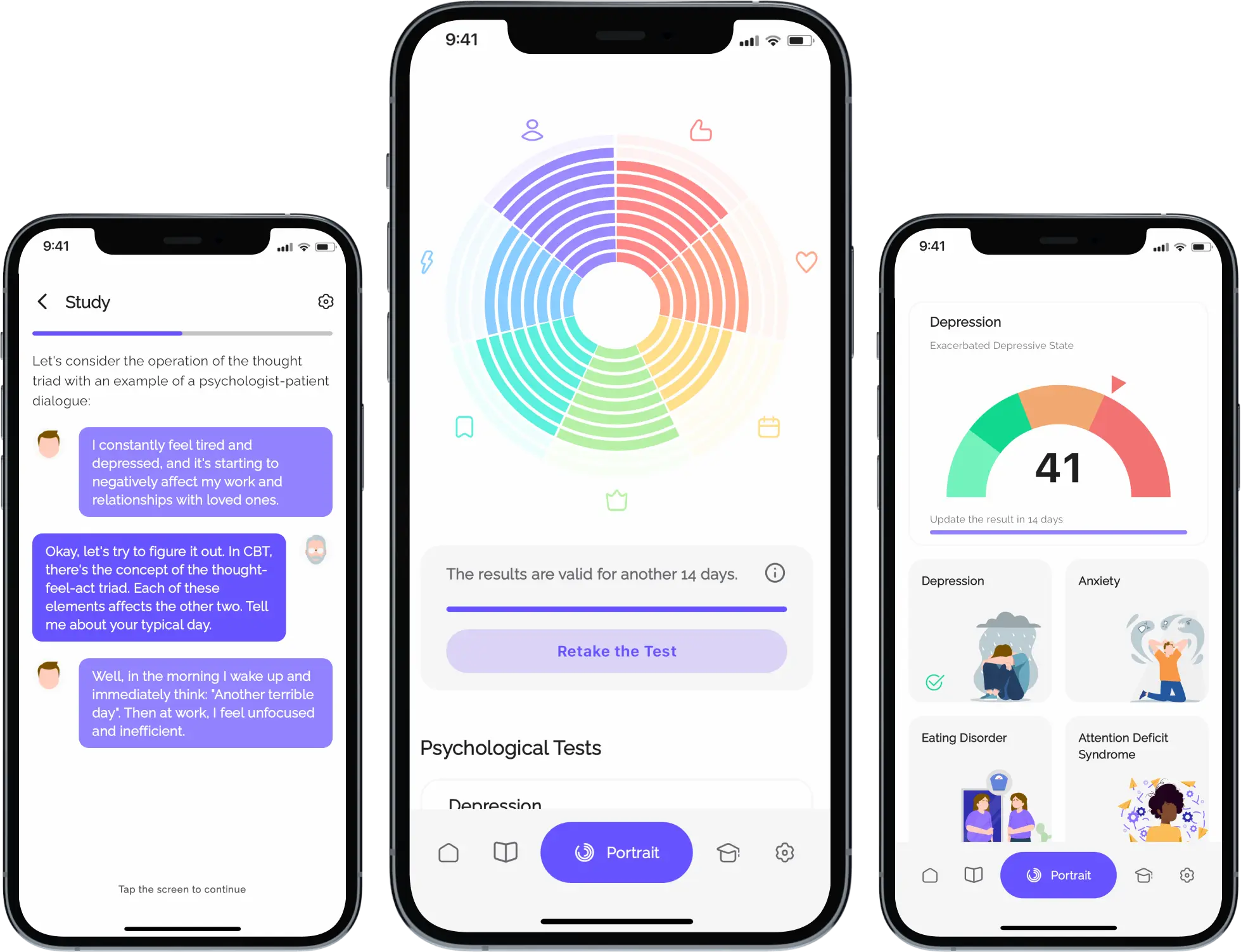
Let’s dig a little into history and find out who laid the foundations of cognitive behavioral therapy and why Sigmund Freud himself got involved in the process— as though he couldn’t just stay in his armchair with his pipe!
We won’t delve deep into dates and facts.
If, after our account, you want to learn the full story more precisely and in greater detail — just check Wikipedia.
Aaron Beck, a future psychology star, was born in 1921.
In childhood, he was that shy little boy who was constantly ill and had a panic fear of doctors (quite ironic, isn’t it?).
But instead of hiding from his fears, he decided to face them: he entered Yale University’s medical school and later chose psychiatry as his specialty.
More content in our app
You're only seeing a portion of the content. In the app, you'll find numerous interactive articles. Additionally, there are psychological tests to track your mood dynamics, a daily planner, an automatic thought journal, and much more!

"Fight fire with fire" – the young Aaron must have thought, battling his blood phobia while spending time in the operating room.
At first, like all respectable psychiatrists of that era, Beck was fascinated by psychoanalysis.
But soon he realized that probing childhood traumas was like looking for lost keys under a streetlamp just because it’s brighter there, rather than where you actually dropped them.
Beck loved precision and evidence, not Freud’s abstract theories.
A renowned and famous figure like Freud needs no introduction, but let’s recall the main principles of psychoanalysis:
It focuses on unconscious processes and childhood experiences.
Psychoanalysts investigate past traumas, conflicts, and relationship dynamics to understand how they influence current issues.
Psychoanalysis is when you pay 35 dollars an hour to complain about yourself.
Robert Orben
A free-form therapy where the client talks about their thoughts and feelings, and the therapist interprets unconscious motives.
Sessions can last several years.
It assumes many of our actions are guided by unconscious processes often tied to repressed wishes and conflicts.
«It is a great misconception to think that the roots of psychological problems must be found in childhood experiences,» Beck wrote.
«It is far more important to understand what is happening in a person’s life right now, how they see themselves and the surrounding world, and in what way they think.»
Freud’s followers believed depression was the result of anger turned inward.
But in the 1960s, while working with patients suffering from depression, Beck noticed that many of them had similar negative thoughts — ‘I’m a loser,’ ‘Nobody loves me,’ ‘The world is a terrible place.’
Aaron Beck took a century-old dogma, discovered that it could not withstand criticism, and created something simple, enduring, and effective to replace it. He basically saved psychotherapy from itself.
Steven Hollon
These thoughts, like a broken record, were poisoning their lives.
He began to wonder: what if these thoughts weren’t just side effects of their condition, but the main cause?
Instead of merely discussing their childhood traumas, he decided to try changing their thinking.
Beck conducted numerous studies that confirmed his hypothesis.
He developed special tests and questionnaires to detect these very negative automatic thoughts, and subsequently devised cognitive therapy, which taught patients to identify and challenge their negative beliefs.
Later, Beck added behavioral techniques to cognitive therapy, and thus CBT — cognitive behavioral therapy — was born.
Beck encouraged patients to focus on their negative beliefs in daily life, rather than on childhood conflicts.
He employed practical techniques to help people recognize and change their destructive thoughts.
For example, he suggested that patients keep diaries in which they recorded their negative thoughts and analyzed them.
This allowed them to see how often they distorted reality and how that distortion affected their emotional state.
Unlike lengthy courses of psychoanalysis, which could last for years, Beck’s sessions lasted a maximum of 12 months and were incredibly effective.
In one interview, Beck admitted: «By abandoning Freud’s method, I immediately felt anxious about my financial well-being.
After ten sessions, clients would say: „Doctor, thank you!
I’ve started looking at life differently and thinking differently about myself and those around me.
I don’t need your help anymore!” And they would leave with gratitude, while my finances suffered.»
Nevertheless, his worries soon faded away.
The cognitive therapy that allowed people to quickly overcome depression and find solutions to their problems made him so popular that he no longer worried about his financial situation.
The method spread rapidly, and by the early 1990s, visiting a cognitive therapist became as fashionable as practicing yoga.
Of course, psychoanalysis and other psychotherapy methods did not disappear.
Every individual is unique, and a single approach cannot suit everyone.
Many modern psychologists and psychiatrists use integrative approaches, combining elements of psychoanalysis with other methods.
However, today CBT is considered one of the most researched and verified approaches.
It is actively used worldwide, and Beck’s name has become iconic among psychology professionals.
His ideas continue to inspire a new generation of psychotherapists, who strive to help people cope with their inner conflicts and find healthier ways to interact with the world.
Now that you know a bit more about its history, I invite those who are interested to continue their exploration on their own.
And I invite everyone else to come along with me!
We really do value CBT (and this is not just empty talk).
Yet in our work, we rely on a scientific approach, and all the techniques we propose are based on proven facts.
So the next section will focus on evidence for the method’s effectiveness.
Get ready for some numbers!
You have been warned!








